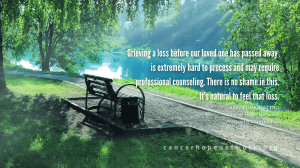Health - Trend Magazine originally published at Health - Trend Magazine
Hope in the face of cancer often means a full life after treatment. But sometimes, our volunteers and clients must look for hope at the end of life.
— Sarah Miretti Cassidy
CHESTER, NJ, UNITED STATES, April 1, 2022 /EINPresswire.com/ — Hope is wonderful. But hope is also hard. Hope in the face of cancer often means difficult surgeries and side effects, followed by a happy, full life after treatment. It means graduations and weddings and unexpected sunsets. But sometimes, our volunteers and clients find themselves looking for hope at the end of life.
At Cancer Hope Network we work to match clients with a Support Volunteer that shares a similar diagnosis, treatment, or other lived experience. For more than 40 years, our trained mentors have been supporting patients and caregivers across the nation from diagnosis, through treatment and into survivorship. Our Final Hope Roundtable focused on the step after survivorship – helping clients navigate the end of their own life or the death of their loved one.
The conversation was led by CHN Coordinator Rachel DiQuattro, who is a certified end of life doula. Rachel’s journey as a doula began with a volunteer-client match. Support Volunteer Lucy (Names changed for privacy), diagnosed with stage 3 breast cancer at age 35 was matched with Marcia, a client who shared a similar diagnosis. The two brave women developed a wonderful rapport and began speaking weekly. Then, Marcia’s diagnosis changed. Lucy didn’t want to abandon her client, but she struggled to know what to do or say to help as Marcia approached death.
As Rachel researched ways to help Lucy support Marcia, she discovered her own passion for helping people find a “good death” – the best version of a journey we each must travel. Today, Rachel has honed that passion into expertise. With her guidance, our group of volunteers had a frank, often challenging, conversation – sharing their individual experiences, remembering painful losses and commiserating about the reality we each must face.
The questions the volunteers gathered to discuss were deceptively simple: How do we navigate the reality of End-of-Life? How do we support our clients on this journey? Where are the boundaries for survivor and caregiver mentors supporting their matches?
Receiving a terminal diagnosis
When someone is given the news of a terminal diagnosis, the first response for the patient and their loved one is often overwhelming emotion. There is no “right” answer. “I’m here and I’m listening” is often the best – and only – response. As the shock wears off, patients frequently have physical, psychosocial, and emotional needs that must be addressed.
Physical needs
Many physical needs, like pain management, are taken care of by medical professionals. Other decisions and needs – from patient safety to deciding between home hospice or care in a facility outside the home – must also be discussed. The safety and health of the primary caregiver(s) is critical. Are they able to care for their loved one physically and emotionally? Financial needs may loom especially large.
“It’s hard to be a caregiver and a wife,” Support Volunteer Kathy recalled. Acknowledging those needs and helping a matched client find additional resources can be a meaningful way for volunteers to help.
Psychosocial needs
Advanced care planning, or “this is what I want at the end of my life,” is imperative. It can also help provide peace of mind for the dying patient and their loved ones. It’s one thing to talk about a DNR (Do Not Resuscitate) order or POLSTs (Physician Ordered Life Saving Treatment) like a feeding tube in the abstract. It’s another to know it may soon be reality. There are many resources online and hospitals, social workers and hospice centers can help with this plan. Ask for help.
Psychosocial needs often include writing wills, planning funeral or memorial services and setting advanced care directives. Planning also includes making sure passwords and important documents are gathered and shared.
Volunteers may find that beginning these conversations helps the patient they’re matched with. For some, that conversation may start with a question to the patient, or a “My Support Volunteer mentioned…..” from a caregiver. For others, a direct approach is more helpful. Support Volunteer Bonnie recalled the tenacity and bluntness required when her husband wanted to avoid discussing his death. “You’re leaving me in the worst possible scenario that you possibly can. I wouldn’t do that to you. Don’t do that to me.” Whatever the case, thoughtful listening and support from the volunteer or friend – and a willingness to seek out and accept help from experts can make the incredibly difficult process of death a little easier.
Emotional needs
For caregivers, anticipatory grief can be a significant emotional weight. Family and friends may experience extreme sadness, despite the fact that their loved one is still with them. “They’re still here. Why am I feeling so sad?”
“Grieving a loss before our loved one has passed away is extremely hard to process and may require professional counseling. There is no shame in this,” DiQuattro reminded participants. “It’s natural to feel that loss.”
For patients, a huge fear is often if their life mattered or concern about how they will be remembered. Legacy work can help. “I’ve worked with clients who have had quilts made of their t-shirts to give to their loved ones…some made videos or books about their life story.”
Another emotional burden sometimes faced by patients is unfinished business, especially in relationships. Volunteers and friends can help them identify these essential “loops to be closed” by making a list of people they feel they need to have conversations with before they pass. At times, a professional therapist or mediator may be helpful in navigating and having these deeper conversations. Chaplains and other spiritual leaders may provide comfort, even for people who’ve spent their lives not actively involved in a faith community.
We recognize that this information is not comprehensive but we hope the practical suggestions and honest sharing provide guidance and encouragement. To request a match, talk with a member of our Programs Team, or to offer your services as a volunteer helping others navigate the end of life, please visit cancerhopenetwork.org or call 877.467.3638 (877-HOPENET)
Sarah Miretti Cassidy
Cancer Hope Network
+1 908-879-4039
email us here
Visit us on social media:
Facebook
Twitter
LinkedIn
![]()
Health - Trend Magazine originally published at Health - Trend Magazine

 ,
,



